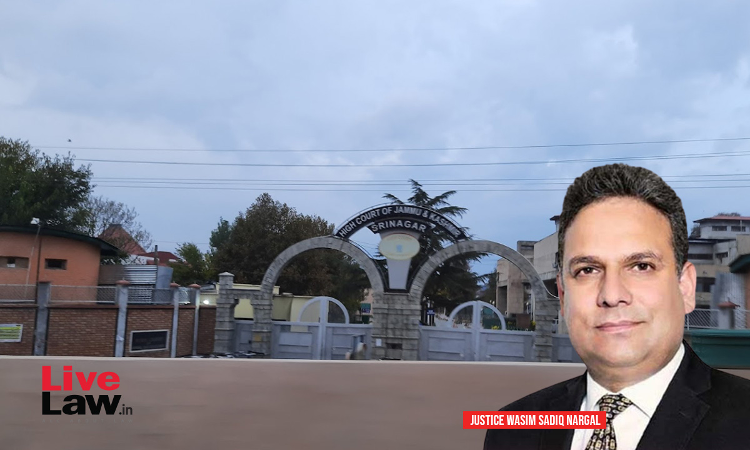- Home
- /
- High Courts
- /
- High Court of J & K and Ladakh
- /
- 'State Cannot Evade It's Financial...
'State Cannot Evade It's Financial Obligations': J&K High Court Calls For Framework On Speedy Payment To Contractors
LIVELAW NEWS NETWORK
27 Sept 2025 7:30 PM IST
The Jammu and Kashmir and Ladakh High Court has held that “the State cannot be permitted to evade its financial obligations” and directed the UT authorities to release ₹97.87 lakh along with 6% interest to a contractor whose bills were kept pending since 2017.Justice Wasim Sadiq Nargal, while pronouncing judgment in the petition filed by M/s Saint Soldier Engineer and Contractor Pvt....
The Jammu and Kashmir and Ladakh High Court has held that “the State cannot be permitted to evade its financial obligations” and directed the UT authorities to release ₹97.87 lakh along with 6% interest to a contractor whose bills were kept pending since 2017.
Justice Wasim Sadiq Nargal, while pronouncing judgment in the petition filed by M/s Saint Soldier Engineer and Contractor Pvt. Ltd., stressed that the Court could not remain a silent spectator to such arbitrariness. “This Court cannot remain a passive onlooker where admitted dues are unjustifiably withheld under the guise of administrative delays or financial constraints,” the Judge remarked, calling for systemic reforms to end the malaise.
The petitioner, a government-registered contractor, was allotted work for laying a 20 mm thick premix carpet on a five-kilometre stretch from Dera Camp to Nikowal Sai. Initially pegged at ₹50.33 lakh, the project cost rose to ₹2.37 crore after its scope was revised to include 50 mm Bitumen Macadam and 25 mm OGPC surfacing, duly approved by higher authorities.
The contractor completed the works in 2017, but despite certification of the final bill and acknowledgments in 2018 and 2020, a balance of ₹97.87 lakh was never released. Citing paucity of funds, the government refused payment, leaving the contractor to seek relief through a writ petition. Aggrieved of the delay the petitioner approached the court for his grievance redressal.
The Court noted that the liability was admitted by the respondents themselves, yet the payment was withheld. It rejected the government's plea of limitation, declaring,
“Once liability is admitted and the State continues to enjoy the fruits of the work executed by the petitioner, it cannot be permitted to turn around and deny payment on the plea of limitation.”
Justice Nargal underscored that execution of work creates a binding duty upon the State to honour its commitments and observed,
“Execution of work gives rise to a corresponding obligation upon the State to honour its financial commitments. Any administrative approval or availability of funds is a matter to be ensured prior to allotment. After execution of the contract, no 'post facto' objection can be raised to deny or delay payment.”
The Court lamented the frequent recurrence of such disputes, where contractors are driven into long-drawn litigation for admitted dues. In words that resonate as a warning, Justice Nargal said,
“If contractors are compelled to knock at the doors of the Court day in and day out for release of legitimate dues, the fault lies not with the petitioner but with the respondents.”
He further warned that allowing such practices undermines governance itself,
“The dignity of governance lies not merely in rule-making, but in timely honouring of obligations, a duty which the State, as a model litigant, is expected to uphold scrupulously.”
The Court invoked Articles 14, 21, and 300A of the Constitution, holding that withholding of dues violates equality, deprives citizens of property without authority of law, and inflicts financial hardship akin to deprivation of livelihood.
Relying on K.T. Plantation Pvt. Ltd. v. State of Karnataka (2011) 9 SCC 1, the court reiterated that property includes contractual entitlements and their denial by executive fiat amounts to expropriation. It also cited Union of India v. Raman Iron Foundry (1962) 3 SCR 556, where the Supreme Court recognised the right to interest on delayed payments, and Ramakrishna Construction Co. v. Union of India (2010) 3 SCC 579, affirming that once liability is admitted, payments cannot be withheld.
The Court referred to its Division Bench rulings in Union Territory of J&K v. Mohammad Atzal Reshi (2024) and UT of J&K v. Tejeinder Singh (2025), which had castigated the administration for similar practices and clarified that limitation laws cannot be used as a shield when liability is repeatedly acknowledged.
While ordering release of the pending dues within four weeks along with 6% interest, the Court issued broader guidelines of general application. It directed that payments cannot be withheld post-completion on grounds of financial constraints, delayed payments must carry interest at bank rates, and in cases of negligence, the liability for interest shall be recovered from the salaries of delinquent officers.
The Chief Secretary has also been directed to formulate a Standard Operating Procedure (SOP) to ensure no admitted dues remain unpaid beyond 60 days of submission of final bills. The Court warned, “In cases of habitual or wilful withholding, apart from interest, exemplary costs may be imposed against the erring department.”
“Let it be underscored that constitutional governance does not permit the State to hide behind bureaucratic excuses while depriving its contractors of their rightful dues. The dignity of governance lies not merely in rule-making, but in timely honouring of obligations, duty which the State, as a model litigant, is expected to uphold scrupulously”, the court concluded.
Case Title: M/s Saint Soldier Engineer and Contractor Pvt. Ltd Vs UT Of J&K
Click Here To Read/Download Judgment



